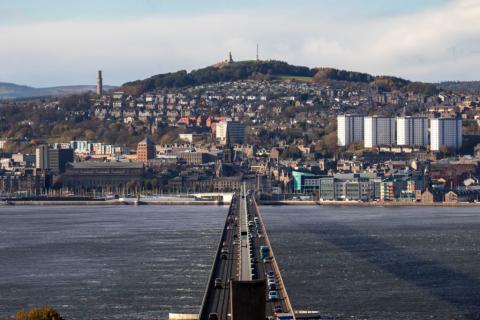By using digital tools and resources such as the Place Standard Tool, ClimateView and Climate Just, Dundee City Council can identify where people are facing social deprivation and are most vulnerable to climate threats, for more targeted climate action.

Dundee City Council
Go To WebsiteAddressed Challenges:
- Greater Fairness
- Health & Wellbeing
Action Areas:
- Energy
- Built Environment
Initiative Purpose:
- Adaptation
The Story

Dundee City Council is developing its climate policies by identifying residents most at risk of extreme weather events and fuel poverty, and targeting support at these groups. This is a fairer approach to tackling climate change because it protects those most at risk from the climate crisis.
The authority has calculated that 31% of its households are affected by fuel poverty, which is above the Scottish national average. And the city’s location leaves it vulnerable to extreme, unpredictable weather events such as flooding.
The local authority has worked hard to identify vulnerable community members before developing climate adaptation policies. It created a risk and vulnerability assessment plan mapping out the threat posed by climate change in 10 defined policy sectors, with supporting actions to help people at greatest risk from these dangers adapt to face them.
By using digital tools and resources such as the Place Standard Tool, ClimateView and Climate Just, the council was able to understand where people are facing social deprivation and are most vulnerable to climate threats.
The authority is also partnering with the National Health Service to build a risk register, pulled together by a Risk Management Officer (a role created by NHS Tayside but based at the council), in order to foster collaboration on winter management plans. This register will identify residents facing extreme weather such as storms, flooding and snow. It will also record the impacts that these events can have, such as interruptions in power supply, heating and water. The tool will help adapt winter management plans into climate risk plans.
Success & Outcomes
So far, actions by the council have re-negotiated over £30,000 of fuel bills, supported over 600 households to receive lower fuel bills through social tariffs, aided with dampness and condensation problems, and given out over 9,000 low energy light bulbs.
A key tool developed by the council is the Dundee Energy Efficiency Advice Project (DEEAP). This advice group plays a significant role in tackling fuel poverty by advising on energy efficiency measures, fuel tariffs and offering tips on reducing energy bills, such as negotiating debts with energy suppliers.
In terms of the monitoring the wider impact of Dundee’s climate action plans, the council has begun to work closely with the University of Dundee to create impact assessments on how policies are affecting vulnerable communities.
In terms of impact internally, the local authority are now going to be working closely with all departments within the council to embed climate resilience into service plans, which will explicitly require services to assist and support vulnerable communities in relation to climate change within their service area.
Advice for others looking to do something similar
Funding larger projects remains a fundamental challenge for the council. Climate change is now at the forefront of leadership and projects at the council since their declaration of a climate emergency, which means some resource has been made available for staff costs and communications. However it is still difficult to access funding for specific projects. A key learning from the climate change team at the council is to be versatile and work across departments such as air quality, housing and energy on climate adaptation. This can allow access to further pockets of funding while also embedding climate action across council departments.
Dundee residents face many social vulnerabilities, with poverty above the national average. Understanding which climate policies will be effective and welcome by more vulnerable residents requires significant community engagement. An interesting process that the council are developing is a new £250,000 Community Climate Choices Fund which will use the democratic process of participatory budgeting to engage and empower communities to implement projects that can reduce climate impacts in Dundee, while helping residents to become more resilient and developing solutions that promote social justice.
